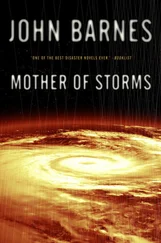On November 11th, nanoswarm infected the nuclear aircraft carrier Ronald Reagan ; by November 14th it was clear that even whole-crew round-the-clock efforts could not eradicate them. On November 17th, 18th, and 19th the ship made one last fast pass northward along the California coast. The helicopters judged to be still safe flew back and forth, off-loading crew onto any wide, flat spot near enough to a town; when the helicopters went bad, the last few hundred of the crew departed in boats. Finally a skeleton crew took her northward, hoping to keep her running long enough to scram her reactors and scuttle her in the Queen Charlotte Trench, eventually to be run over and buried several miles deep by North America itself. If the reactors did not breach in the next few decades, the ship would be under a hundred feet of bottom mud before any radioactive materials leaked. Nobody had heard from Ronald Reagan since; probably there wasn’t a working radio on board, but they had hoped that the captain and residual crew would have been able to reach shore in a small boat by now and find an operating ham or other way to call in.
The Sixth Fleet, after losing two support ships and about forty planes to airborne nanoswarm, had made the risky run through Gibraltar, and joined the Second Fleet, out in the Atlantic. The Navy ships didn’t have much of anywhere to hide; near the American Atlantic coast, prevailing winds carried nanoswarm and biotes eastward, and the Gulf Stream flowed out of extremely human-and-technology-infested waters.
To conserve precious oil, the nuclear ships towed the others, as much as possible. They spent several days on the Grand Banks because the fishing was good, and there were many thousands of mouths to feed, but those waters are rough in November, and they had to flee southward at the first signs of storms.
Satellite and cautious air reconnaissance revealed all but complete collapse in Africa, without even apparent local order; India appeared to be holding together with a couple of sizable rebellions under control and immense planting efforts under way. South America was in flux, with some local military commanders carving out chunks of territory and threatening to seize capitals, but the analysts thought it would stabilize into something like its old map, with a few cities and provinces either becoming independent or switching nations; Europe was breaking down in something that looked distressingly like warlordism, and famine was worst there. Streams of refugees poured up the Rhine Valley and across the German plain from the Low Countries; without power machinery for the pumps, the sea was creeping in, and everyone knew that in a bad storm, there would be no rescues. Russia was collapsing into the hands of dozens of petty kings, each with his own transmitter, manifesto, and mission to save the world, but at least it looked like a fair amount of winter wheat was being planted; if roads to the west, especially rail lines, were re-opened soon enough, next year might be better.
After a rocky few weeks, central Mexico was regaining control of the rest of the country, and the Mexican government was in regular touch with Washington and Ottawa; there was talk of a unified continental policy, and of joint action to stabilize the Caribbean, where drug lords, local military, religious cults, criminal gangs, and American filibusteros were re-creating the Pirate’s Main of four hundred years before.
The American Midwest and East were freezing and starving; surely not all of the reports of cannibalism were true, but it seemed likely before spring. Death tolls from exposure and hunger-related diseases were high but nothing like those in Asia or Europe. The South was under “soft martial law”—local military bases providing government services—and doing fairly well, with little chafing at the lost rights so far. Mountain West city and county governments seemed to be holding together.
More than sixty different theocracies had been proclaimed in California alone, which was turning into another general pool of anarchy.
For Federal, State, and local governments, the libertarian/survivalist Castles were rapidly becoming more of an asset than a liability. President Norcross turned back a request from Harrison Castro and forty other freeholders to grant them an official status, but he did permit Federal agencies to acknowledge Castles both as locations and as local governments in his reports. “Just a matter of reality,” he assured his staff. “Yes, we’ll need to remind them that they’re large local businesses, not feudal fiefs, sometime. But for right now, most of ’em do what we need ’em to do, so don’t let’s pick any fights we can’t afford.”
The divisions went on, everything everywhere splitting into more pieces; and as the pieces began to make their own way in the world, they began to take different pathways.
Differentiation is the way a blastula becomes, eventually, a whole new person in its own right; no longer a blob, its cells become bone and muscle, hair and blood, and then arm bone and leg muscle, eyebrows and scalp hair, a pumping heart, a seeing eye; and three weeks after Daybreak, differentiation was proceeding.
CASTLE LARSEN. (JENNER. CALIFORNIA.) 11:00 A.M. PST. WEDNESDAY. NOVEMBER 27.
“Maybe we should stop for today and start again on Friday,” Larry Mensche said, “I’d still like to ask about a few things, but you’ve already had two seizures and you look exhausted.” Funny thing, he thought, with this one, you don’t do tough-cop nice-cop, you do “the nice cop who is pleased” and “the nice cop who is disappointed.” Going by what I’m seeing of her personality here and now, this little girl shouldn’t have been able to be a shoplifter , let alone a terrorist—she was only ever any kind of rebel because she didn’t want to disappoint her parents. While he waited for her answer, he filled a glass with cold water from the pitcher and handed it to her.
She drank gratefully. “Why not tomorrow?”
“It’s Thanksgiving,” he said, “and I guess Quattro Larsen has sort of a big day planned. He’s—”
Ysabel’s face crumpled and she grabbed for a fresh handkerchief from the pile beside her.
He sat beside her on the couch and asked, “Missing your family?”
“Yeah. Used to be Dad and Mom called from wherever in the world they were, no matter the cost or the inconvenience. They never had anything to talk with me about… or we’d have a really brief cold awkward conversation… or we’d argue. But it was something that happened every Christmas and Thanksgiving. But they were in backcountry Tanzania, so…” she seemed to grope for some conclusion, and settled on, “now they can’t call.”
She wiped her eyes furiously, adding, “And considering I’ve just helped a few hundred million people starve to death, I have a lot of fucking nerve getting upset about having my Thanksgiving spoiled.”
“You feel what you feel.”
“Thank you. You’re very nice to me.”
“You know things I want to know, Ysabel. And you tell me. I stay nice because you stay cooperative.”
She looked up at him with a sadly twisted little smile. “So if I ever stop talking, you’re going to get out your Taser?”
“No,” he said, “and Bambi wouldn’t either. We’d just turn you over to someone else who would.”
“That’s how things work, really, isn’t it? Daybreak used me to get you, you’ll use me to get Daybreak.”
“Would you like food, or do you just want a nap?”
“I feel like a piece of wrung-out shit, but seizures make me hungry, I guess they burn a lot of energy. If there’s any of that bread left from breakfast? With maybe some of the veggie butter? The sugar rush’ll probably knock me out.”
Читать дальше












